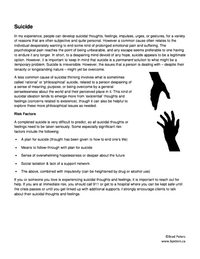DEPRESSION
The diagnosis of depression involves experiencing symptoms that may include: depressed mood, diminished interest or pleasure in most activities, significant weight loss or change in appetite, sleep problems, physical agitation or slowing, fatigue or loss of energy, feelings of worthlessness or excessive or inappropriate guilt, a decrease in concentration or focus, and recurrent thoughts of death and/or suicide.
The symptoms of depression are more than what might be considered normal or healthy feelings of loss or sadness that result from situational events or life circumstances. For example, it would be healthy (and expected) that an individual would be upset and sad when trying to cope with the loss of a loved one or when experiencing a separation or divorce. For most of us, this kind of grief or sadness will subside with the passage of time and with support from others. Importantly, individual's dealing with depression will experience significant distress or impairment in their social, occupational, or other essential areas of functioning (APA, 2000). In other words, Depression often makes it extremely difficult for a person to cope with living.
Treatment of Depression
While a wealth of research has accumulated that demonstrates the effectiveness of therapy in treating Depression, the symptoms of the disorder often make it difficult for individuals to seek help. For example, it is often the case that someone dealing with depression will have a negative view of: 1) themselves (i.e. "I am worthless"), 2) the world/environment (i.e. "the world is cruel and unfair"), and 3) the future (i.e. "the future is hopeless"). These are the three components known in the field of clinical psychology as the cognitive triad of depression (Beck, 1995). These cognitive beliefs may cause a person to feel that their problems are their own fault or theirs alone to deal with, that they would be "burdening" others by talking about their feelings, that people would not really want to help them or may have ulterior motives for doing so, or that nothing is likely to change, so it may be hopeless to try.
Seeking out help is the first step toward change. No one should have to deal with their feelings alone, and there are plenty of good psychologists in Halifax who are willing to help. Speaking with a psychologist provides a forum to be heard, validated, and understood without judgment. A client and therapist work collaboratively to discover where the presenting issues may have developed and to make sense of them in light of an individual's background and current life circumstances. A plan is then formulated to get "un-stuck" and to open up opportunities for mental health and personal growth.
PDF Handouts
Recommended Reading
The Mindfulness Code: Keys for Overcoming Stress, Anxiety, Fear, and Unhappiness
(Donald Altman)
This book discusses depression and anxiety within the context of our exceptionally fast-paced modern lifestyle. It uses brain science and mindfulness practice to suggest everyday strategies that can be used to harness a less encumbered state of mind. This is a great book for those who wish to explore mindfulness and are new to its practice - essentially, learning to live more 'in the present moment,' while not allowing more disingenuous states of mind overwhelm us. Several of our clients have found this book to be a helpful adjunct to therapy.
In Search of Happiness: Understanding an Endangered State of Mind
(John F. Schumaker)
Schumaker takes us through a thoughtful critique of what it means to be happy in a postmodern age that emphasizes consumer-driven definitions of success and well-being. The reader will begin to question what happiness means to them. Schumaker makes a strong argument for sustainable forms of happiness and against materialistic cultural assumptions that would see us 'work ourselves to death, then spend our money on the biggest coffin we can afford.' While not quite a 'self-help' book, the 'happiness keys' spread throughout the book offer thoughts and insights that are worth the read alone.
References
American Psychiatric Association (2000). Diagnostic and Statistical Manual of Mental Disorders (4th ed., Text Revision). Washington, DC.
Beck, J. (1995). Cognitive Therapy: Basics and Beyond (1st ed.). Guilford Press, New York: NY.






